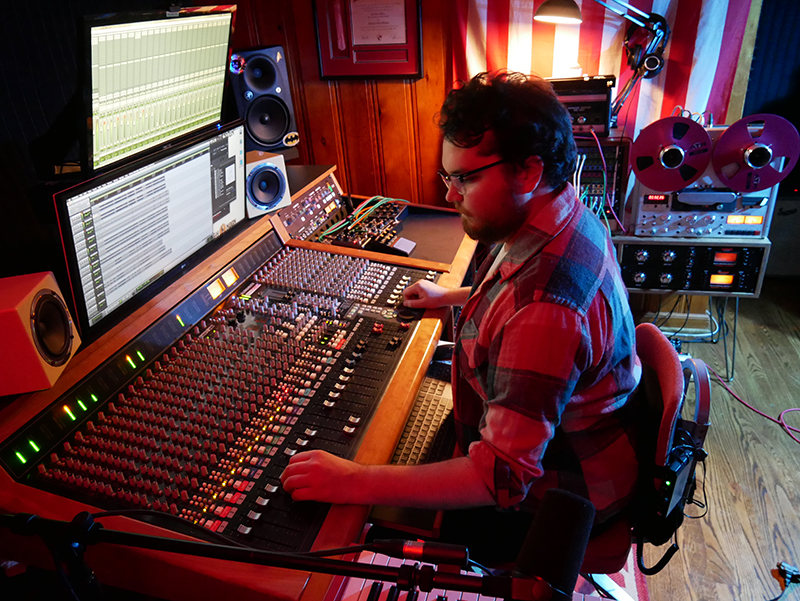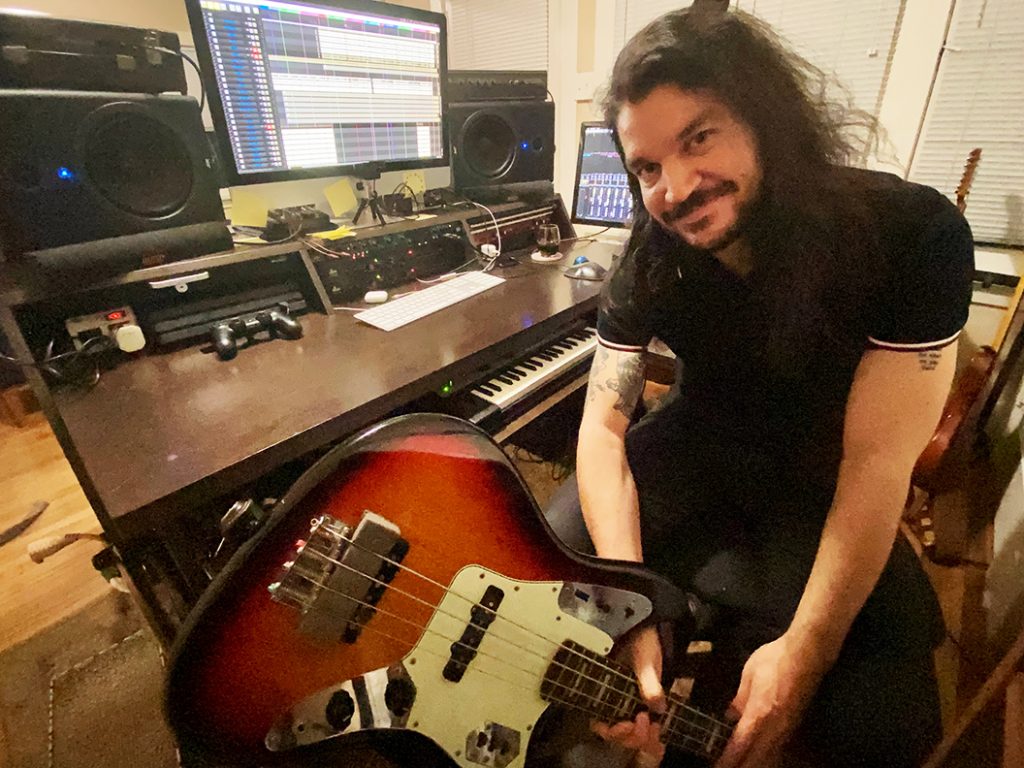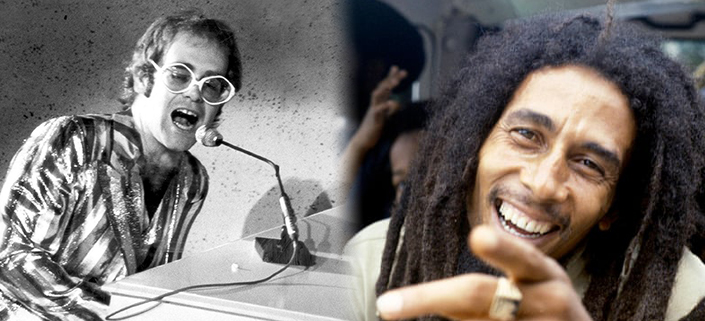By Keith Walsh
Growing up in Britain and becoming a global musical phenomenon, Elton John was far away from Kingston, Jamaica. Yet in the new four song set from Black Market Dub, Nate Bridges and his crew do a convincing job of reimagining, by way of remix, some of Elton’s classic tracks as reggae tunes in a dub style. I spoke with Nate Bridges, Sam Small and Brandon Niznik (aka Wise Owl) who created these ear-pleasing tracks.
Nate Bridges is the owner of High Noon Audio in Nashville, Tennessee, where he records his Black Market Dub tunes. He is a graduate of Berklee College Of Music in Valencia, Spain, and worked at Capitol Studios in Hollywood before starting his own studio.
Synthbeat: Were there any challenges with creating dub from such a ‘white’ artist? I hope this questions doesn’t seem too insensitive.
Nate Bridges: “No, not really. Part of the challenge of this project is to remix music that you may not expect would work as reggae or dub. But honestly, I think Elton John fits all the criteria I typically look for when searching for an artist to reinterpret. His songs are obviously fantastic, and a lot of them you can dance to. I know what you mean though, Sir Elton is about as far as you can get from Kingston!”
“But again, at the end of the day, he writes fantastic pop songs. All fantastic pop songs will translate to reggae, no matter the artist. As I get deeper into this project I really want to continue to push the boundaries of what people expect would ‘work.’ Brandon and I have had a lot of conversations lately about taking this project in very weird directions in the future, but for now, I’m loving working on classics like Elton John. ”
Synhtbeat: There are long sections in ‘Rocket Man,’ ‘Tiny Dancer,’ and ‘Goodbye Yellow Brick Road’ without downbeat reggae beats, mostly in the intros. Was there a challenge in making these into dub versions? What aesthetic decisions informed this approach?
Nate Bridges: “These sections were a challenge, no doubt about it. The first track we tackled together was ‘Rocketman’ and I left the intro section open for Brandon to fill in (which he did a great job with). ‘Tiny Dancer’ and ‘Goodbye Yellow Brick Road’ also have extended intros like this, and partly to keep from repeating ourselves I opted to just leave them alone more or less. I feel like, after 4-6 minutes of heavy reggae, a bit of Elton alone at his piano is earned and breaks up the EP in a nice way. Plus I just plain ran out of time! How does the saying go? ‘Art is never finished, it’s just abandoned?'”

Synthbeat: Are you a huge Elton fan? I’ve been listening since the mid 70s when I was very young and finally saw him in 2019 at the Staples Center in Los Angeles. It was epic.
Nate Bridges: “I can’t honestly say I’ve been a huge fan of his for a very long time, but that’s not because I never liked his music. I have a whole laundry list of artists that I know I’ll love but I just haven’t gotten to yet. My mom was actually a huge Elton fan, and I sort of inherited a lot of her old records, many of which are his classic 70s records. They’ve sat on my shelf for a long time, and I’ve finally gotten around to listening to them.”
“While I worked at Capitol Studios, Greg Penny (one of Elton’s longtime engineers) was basically a resident of Studio C, which is a Dolby Atmos mix room. Greg and one of Capitol’s staff engineers Nick Reeves were incredibly kind and would let me sit in on a ton of their mix sessions to turn “Rocketman” into a wildly incredible spatial experience, the likes of which I have not encountered before or since. Greg would even ask what I thought of certain decisions they were making, but it was honestly so impressive it was hard for me to get my jaw off the ground half the time.”
“Greg told me stories of how he met Elton in the 70s, and he was really one of my favorite people I met through my time at Capitol. Between those old records, and getting to hang out with Greg Penny, Elton John became a sure bet for the remix treatment. I keep daydreaming that he’ll hear this EP and feature it on his Rocket Hour podcast or something. ”
Synthbeat: Brandon Niznik as Wise Owl has become a semi permanent member of Black Market. What qualities led to this decision? What did he bring to these Elton mixes?
Nate Bridges: “Brandon is and has always been my secret weapon whether he is actively playing on my tracks or not. Brandon and I have been in bands together, went to high school together, lived together in LA, and even had the same mentor and teacher in Brian Wallace. We have so much in common musically and he was instrumental in reinvigorating my love of reggae once I got back to the US. Brandon is an incredible musician, and has a vastly deeper knowledge of reggae and dub than I do. He has thought me a ton about mixing and playing music, and I’ve always said that had we not lived together I don’t know what shape Black Market would be in today.”
“While I make all of the arrangement decisions and select many of the songs we do, I’m basically providing Brandon (and Sam for that matter) a frame for them to build on. I build the basic structure’s of these tracks, flesh out the chord progressions, etc. and Brandon comes in and adds the feel these songs need to pass as authentic reggae recordings. I’m always astounded by how differently he approaches things than I would, and his playing is always so consistent and excellent. When someone like Brandon is offering to play on my music, I just can’t turn it down. ”
“As for these tracks specifically, the three of us really had very specific roles each of us brought to the project. Each song would start with me building the overall skeleton of the track (tempo mapping, guitar/piano parts), then going to Brandon for bass and anything else he felt he could add (often organ, keys, additional guitar), from there, would go to Sam Small for acoustic/lead guitar work, and then back to me for the final dub/mix/master process. Sam and Brandon are key to this EP passing as anything resembling remixes that could even remotely stand up to the original records. Sam Small is my favorite guitar player alive, and I’m talking about all of them. I couldn’t have asked for a better team for this EP. ”
Synthbeat: What’s next for Black Market? How about some dub versions of 80s synthpop tunes? Could be interesting and challenging!
Nate Bridges: “On May 7th I am releasing a collection of Grateful Dead remixes for Bandcamp Friday. I’m again working with Sam Small and Brandon Niznik just like we did on the Elton John EP. Brandon was kind of the star of the show on the Elton John EP, but this next one is really in Sam’s wheelhouse. He is front and center and pulling off some incredible work as my own personal, in-house Jerry Garcia. The Venn diagram of Dead fans and reggae fans is a circle.”
“The Grateful Dead is one of those groups that just makes too much sense not to do, and when I have an arsenal of players who can pull it off I have no choice. It’s gotta be done. Following that, you can expect Blondie sometime this summer, and… others! Honestly, I decide what to next a few days after an EP drops. There is so much work to do to finish one of these in one month that if I get too distracted about what might be coming up it makes it hard to finish. Half the fun is that you know just as much about what we’ll do next as I do! ”
Brandon Niznik is an LA-based musical artist and audio engineer who contributes a variety of instruments to Black Market projects, and has since been recruited as an official member of the project. His other projects include Horsemouth, Penny Reel, and Rian Basilio And The Roosters.
Synthbeat: What organ did you use on these Elton dubs?
Brandon Niznik:” I used the “Lowest Drawbar” preset on the NN-XT sampler in Reason. I use the mod wheel to control the fast/slow rotary speaker effect to mimic what I’d be doing if I was playing a real B3 through a Leslie. That’s the point where it goes from sounding like a nice organ patch to “damn, who let you use their organ?” I’ve been using Reason since version 1.0, and their quality of real-world instrument emulation has blown up over the years.”
Synthbeat: For the Rhodes, was it actual? Do you prefer that to the Nord emulation and is it worth hauling it around?
Brandon Niznik: “The Rhodes is fake too! It’s a patch called “ROADS-EP” from a collection of user-made patches for the microKORGXL by someone named Howie. I play all my keyboard instruments on that microKORGXL, whether on-board or MIDI-controlled. If I still had my Nord Electro I would use it for a Rhodes sound instead, that’s my favorite electric piano emulation. As far as the real thing, I personally wouldn’t be willing to take a Rhodes anywhere outside the studio. That’s almost entirely because of laziness, not because I’m protective of the gear. The sound of a real Rhodes is unbeatable when that’s the right sound for the part, but not every song calls for a completely authentic sound — sometimes I would actually choose to get a sound that is unnaturally clean on purpose and use a keyboard patch.”

Synthhbeat: What bass guitar did you use? What tracks have your guitar?
Brandon Niznik: “I played all these bass parts on my Fender Jaguar bass. There’s a piece of foam underneath the strings at the bridge, which greatly affects the dynamics of each note. And all four strings are tuned down one whole step from standard tuning. I haven’t gotten very scientific with how exactly that affects the sound, but it’s something I did years ago, and I haven’t switched back. ”
“On this particular Black Market EP the only guitar part that I played is the wah guitar part in ‘Rocketman”’ This EP is very rich with crazy guitar wizard-men with Sam and Nate, so it was nice to sit back and enjoy what they played on it.”
Synthbeat: For these Elton tracks was there anything about the process that differed from standard dub music making?
Brandon Niznik: “Yes, playing these songs in the style of reggae is very different than what playing reggae is normally like. And not just with Elton John’s songs — it can be a special challenge to play any rock music in the style of reggae. That’s because reggae, like any other style of music, has certain rhythmic and musical rules that have to be followed. Like, there are a few things the drums can do rhythmically, a few things the bass can do, and so on throughout the band. And within those rules, there are infinite possibilities of what you can do with reggae. But only within those rules — because if you take some of those rhythmic properties away, it isn’t reggae anymore!”
“So the thing that’s different about making an Elton song reggae is that it was written inside of a different set of rules! His songs make use of the rules of rock’n’roll, which aren’t the same as reggae. Plus, there are a bunch of iconic little features of rhythm and music in these classic songs, and it would sound wrong to your ear if you were to hear it without those little things! And some of them make absolutely no musical sense in the rules of reggae.”
“The challenge we set for ourselves when we do a Black Market thing is that it has to be the REAL original song AND it has to be REAL reggae. We gotta do both at the same time, or we aren’t happy with it. So it can take a lot of time and be very frustrating to come up with a bassline to play that fits Elton’s music AND is something that doesn’t deviate from what an authentic reggae bassline is.”
“I livestream my recording sessions a lot on Instagram, and sometimes I wonder if people are like “damn, why is this guy taking an hour to come up with one damn bassline?’ It’s because I’m trying to simultaneously satisfy two disciplines of music, fool! But we always get there, and we are super stoked about the final product. It’s worth the effort.”
Sam Small is based in LA, where he records guitars for the Black Market project. He is a graduate of Berklee College Of Music, with an emphasis on guitar.
Synthbeat: What guitars are you using, and what does your pedalboard look like, if you are using one? Do you have any Fender guitars?
Sam Small “ I used a Gibson Les Paul Jr. and a strat that I built (sounds like a 60s strat) through a Fender Tweed Deluxe amp, with which I use a Universal Audio OX Box, which lets me run the guts of the amp directly into my DAW with cabinet and room simulation. I’m pretty strictly a Fender/Fender style amps guy but go all over the place with guitars. I did some processing with plugins to my guitars (definitely a little space echo on the slide part on “Rocket Man”) and Nate may have added some stuff as well, but you’d have to ask him. ”
“My pedalboard was living in the studio so it didn’t make an appearance on this, except for my Ernie Ball Volume/Tuner pedal (which rocks), but I have a decent size setup. Some favorites are my Analog Man Sunbender 1.5, my custom treble booster made by my friend Chris Vincent (R2R Electric / @djlavalamp on IG), Benson preamp, JHS Unicorn, Demedash VHS tape delay, Land Devices Domino, and ZVEX Super Hard On. I’ve also got an EBO E-Verb unit, which is really worth checking out for anybody who likes real tube/spring reverb. As for the process, I just tried to stick as close to the parts that are on the original Elton records to lend some of the original vibe to the whole thing. Nothing I did was particularly dubby.”
Patreon.com/BlackMarketDub
Youtube.com/c/BlackMarketDub
BlackMarketDub.Bandcamp.com
wiseowlsound.bandcamp.com
samsmall.bandcamp.com
finis
